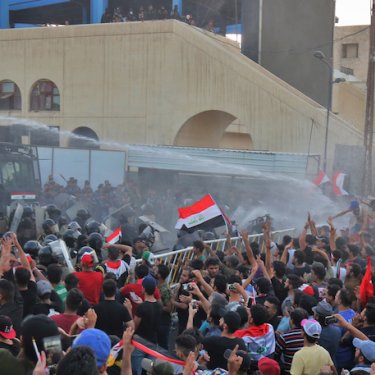Iraqi authorities obstruct media coverage of protests

What with arrests and intimidation of journalists and Internet blocking, coverage of a major wave of protests in Iraq since the start of the July has been difficult and dangerous for the media. Reporters Without Borders (RSF) reminds the Iraqi authorities that they have a duty to protect journalists and to not obstruct the freedom to inform.
The victims have included Ahmad al Abdi, Dijlah TV’s bureau chief in the holy city of Najaf (160 km south of Baghdad), and two of his cameramen, who – despite being clearly identified as journalists – were stunned by tasers, insulted, threatened and detained for three hours when they covered the protests at Najaf airport on 13 July.
Al Nujaba TVcorrespondent Issa al Atwanywas also clearly identified as a journalist on 14 July when he was covering protests in Babil, the province immediately to the south of Baghdad. But he, too, was attacked by police, who broke his arm.
Atwany received an apology from the local police force’s head of public relations but that has been an exception since the start of this wave of protests against unemployment, corruption and poor governance, in which 14 peoplehave so far been killed and reporters have repeatedly been exposed to violence and intimidation.
“All of the incidents registered by RSF since the start of this wave of protests point to a clear desire by the Iraqi authorities to obstruct journalists’ work, which is both worrying and unacceptable,” said Sophie Anmuth, the head of RSF’s Middle East desk. “Instead of arresting, threatening and even attacking journalists, the government must guarantee their safety and allow them to freely exercise the right to inform.”
Warnings, arrests and intimidation
Several journalists told RSF they have received warning messages or have been directly threatened by persons clearly linked to the security forces or pro-government militias. Asia Satreporter Haydar Salehsaid he and his photographer were briefly detained on 13 July by members of Asaib Ahl al Haq, a Shia militia affiliated to the outgoing government, while covering the demonstrations in Najaf. After being handed over to the police, they had to sign an undertaking to stop covering the protests.
Their case is not isolated. According to the information gathered by the Journalistic Freedoms Observatory (JFO), RSF’s partner organization in Iraq, at least four other journalists have been forced by the Iraqi security forces to sign statements undertaking to stop covering the protest movement.
Another form of intimidation was reported by Asia Sat’s Haydar Saleh. He said that, the day after his heavy-handed arrest in Najaf, the police threw a stun grenade at him while he waited outside the governor’s office to interview the governor and was clearly identified as a journalist. He had to undergo an operation for the resulting injury to his ear.
A journalist in Najaf who asked not to be identified said he had learned from a source close to the intelligence services that he was on a list of journalists circulating within the police. In Karbala, another Shia holy city 100 km southwest of Baghdad, Haider Hadi, who is regarded as one of the city’s few independent journalists, was followed to his home by unidentified individuals on 20 July, immediately after covering the protests there.
Internet and social networks blocked
Iraq was suddenly deprived of the Internet on the morning of 14 July, six days after the start of the wave of protests and as they were growing in size and reaching the capital. Social networks were completely inaccessible for several days even after the Internet was partially restored on the evening of 15 July.
Internet connections are still very slow now, forcing most journalists to use VPNs and affecting the few independent media outlets, which for the most part publish or broadcast online.
After initially denying any role in the loss of Internet services and blaming technical problems, the Iraqi government finally owned up. Communications minister Hassan al Rashed admitted at the start of this week that the government disconnected the Internet and then blocked social networks for security reasons. “Demonstrators had been abusing them,” he said.
This is the first time since the US-led invasion in 2003 that Iraq has suffered such a massive loss of Internet. Until now, Internet blocking had been only partial, as in 2014in an attempt to slow Islamic State’s advance or during school exams in an attempt to prevent cheating.
Oday Hatem, an Iraqi journalist and writer based in France who heads the Press Freedom Advocacy Association,said: “In blocking social networks and intimidating journalists, the government’s goal is not so much to limit the number of demonstrators. Its main goal is to be able to crack down on the demonstrations without being seen and to restrict international media coverage as much as possible.”
Iraq is ranked 160th out of 180 countries in RSF's 2018 World Press Freedom Index.



